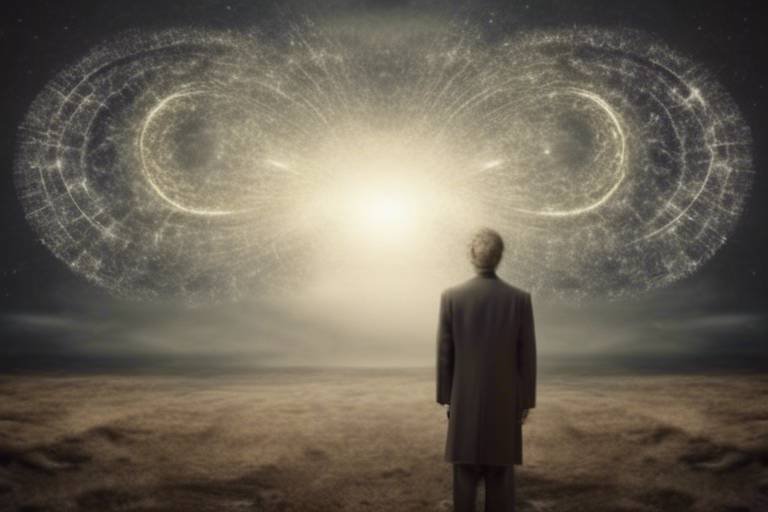Interrogating Space and Time: A Metaphysical Approach
Have you ever stopped to ponder the very fabric of reality? It’s a question that has intrigued philosophers, scientists, and curious minds for centuries: What are space and time? These two concepts form the backbone of our understanding of the universe, yet they remain shrouded in mystery and complexity. In this article, we will embark on a journey through the philosophical dimensions of space and time, examining their implications in metaphysics, science, and human perception. Prepare to challenge your existing notions and explore these fundamental concepts in a way that invites wonder and inquiry.
When we think about space, we often envision a vast, empty void—an expanse that holds the stars, planets, and galaxies. However, the philosophical interpretations of space have evolved dramatically over time. From ancient Greek philosophers like Aristotle, who viewed space as a container for objects, to modern thinkers who question the very existence of space as an independent entity, the discourse has been rich and varied. Space is not merely a backdrop for events; it shapes our understanding of reality and existence itself. It raises profound questions: Is space an absolute entity, or is it defined by the relationships between objects within it? This debate continues to influence both scientific inquiry and metaphysical thought.
Time, much like space, is a concept that eludes easy definition. It is often perceived as a linear progression from past to present to future, yet philosophers have long debated its true nature. Is time a physical phenomenon, or is it merely a construct of human consciousness? The implications of these questions are staggering, as they touch upon our understanding of existence and our place in the universe. Time influences our experiences, shapes our memories, and dictates our actions. It is both a relentless force and a subjective experience, leading us to consider how we measure it and what it truly means to "pass" through time.
In the realm of philosophy, the debate between absolute and relational theories of space is particularly compelling. Absolute theories, championed by Isaac Newton, argue that space exists independently of objects. In contrast, relational theories, proposed by Gottfried Wilhelm Leibniz, assert that space is defined by the relationships and distances between objects. This fundamental difference has profound implications for how we understand physical reality. For instance, if space is absolute, it suggests a fixed framework within which events occur. Conversely, if space is relational, it implies that our understanding of reality is inherently dynamic, shaped by the interactions of objects.
Newton’s view of space as an absolute entity revolutionized scientific thought. He proposed that space is a vast, unchanging expanse that exists independently of the objects it contains. This perspective laid the groundwork for classical mechanics and influenced countless scientific advancements. However, it also raised questions about the nature of reality: If space is a fixed backdrop, what happens when objects move through it? This led to a deeper inquiry into the relationship between space, time, and motion—a relationship that would later be challenged by modern physics.
In stark contrast, Leibniz argued that space is not a separate entity but a network of relationships. He believed that without objects to define it, space has no meaning. This relational view emphasizes the interconnectivity of all things and suggests that our understanding of reality is shaped by interactions. Imagine a dance floor where the dancers define the space through their movements; without them, the floor is just an empty area. This perspective invites us to reconsider how we perceive our surroundings and our place within them.
The philosophical implications of time are equally profound. Time flows in a direction—from past to future—yet our experience of it can feel elastic, stretching and compressing based on our perceptions and experiences. Some philosophers argue that time is an illusion, a construct of human consciousness designed to make sense of change and motion. Others contend that time is an essential aspect of the universe, integral to the fabric of reality. This dichotomy raises questions about the nature of existence: If time is an illusion, what does that mean for our memories, our plans, and our understanding of causality?
Modern physics offers fascinating insights into the nature of time, particularly with the advent of theories like relativity and quantum mechanics. These theories challenge traditional notions of time and reveal a more complex, intertwined reality. For instance, Einstein's theory of relativity posits that time is not a constant; it can be affected by speed and gravity. This has profound implications for how we perceive the universe and our place within it.
One of the most intriguing aspects of relativity is the concept of time dilation. According to Einstein, as an object approaches the speed of light, time slows down for that object relative to an observer at rest. This means that astronauts traveling in space at high speeds would age more slowly than people on Earth. Imagine two twins: one stays on Earth while the other travels in a spaceship near the speed of light. When the traveling twin returns, they would be younger than their Earth-bound sibling. This phenomenon challenges our intuitive understanding of time and raises questions about the nature of reality itself.
Quantum mechanics further complicates our understanding of time. In the quantum realm, particles exist in a state of probability until observed, leading to questions about causality and the sequence of events. If time is not linear at the quantum level, what does that mean for our understanding of cause and effect? The implications are staggering, suggesting that our perception of time may be fundamentally flawed. It invites us to consider whether the past, present, and future are as distinct as we believe or if they exist in a more fluid, interconnected manner.
- What is the difference between absolute and relational theories of space?
Absolute theories propose that space exists independently of objects, while relational theories argue that space is defined by the relationships between objects. - How does time dilation affect our understanding of time?
Time dilation suggests that time is not constant and can vary based on speed and gravity, challenging our intuitive notions of time. - What role does time play in quantum mechanics?
In quantum mechanics, time is not always linear, raising questions about causality and the nature of events.

The Nature of Space
Space, that vast and seemingly infinite expanse that surrounds us, has captivated human thought for centuries. It's not just a backdrop for physical objects; rather, it serves as a canvas upon which the drama of existence unfolds. Philosophers, scientists, and thinkers have grappled with the concept of space, attempting to unravel its mysteries and implications for our understanding of reality. Have you ever stopped to ponder what space truly is? Is it merely an empty void, or does it possess inherent qualities that shape our experience of the universe?
Throughout history, space has been interpreted in various ways, each perspective shedding light on different aspects of our existence. From the ancient Greeks, who viewed space as a container for objects, to modern physicists who describe it in terms of geometry and relativity, our understanding of space has evolved dramatically. One might liken our exploration of space to peeling an onion—each layer reveals deeper insights, but it can also bring tears as we confront the complexities of existence.
Consider the following interpretations of space:
- Absolute Space: This view posits that space exists independently of the objects within it, akin to a stage where the play of the universe unfolds.
- Relational Space: In contrast, this perspective argues that space is defined by the relationships between objects, much like a web connecting various points of interest.
- Curved Space: Advanced theories suggest that space can be warped and curved by mass and energy, leading us to rethink our notions of distance and direction.
As we dive deeper into the philosophical interpretations of space, we encounter the dichotomy between absolute and relational theories. The absolute theory, championed by Sir Isaac Newton, portrays space as a fixed framework, an unchanging backdrop against which events occur. This perspective influenced scientific thought for centuries, establishing a foundation for classical mechanics. However, it raises questions: If space is truly absolute, what does that mean for the objects within it? Are they merely passengers in an unyielding vessel?
On the other hand, Gottfried Wilhelm Leibniz presents a compelling counterargument with his relational view. He asserts that space does not exist in a vacuum but is instead a network of relationships between objects. Imagine a bustling city—its essence is not found in the empty streets but in the interactions between people, buildings, and activities. Similarly, Leibniz's perspective invites us to consider how the relationships between objects shape our understanding of space itself.
Ultimately, the nature of space is not merely a philosophical inquiry; it has profound implications for our understanding of reality and existence. As we contemplate the vastness of space, we are reminded of our own place within it. Are we mere spectators in a cosmic theater, or do we actively participate in the unfolding narrative of the universe? The answers may elude us, but the questions themselves enrich our journey of exploration.

The Concept of Time
Time is one of those elusive concepts that we often take for granted, yet it plays a crucial role in shaping our understanding of reality. Have you ever stopped to think about what time really is? Is it merely a way to measure the passing moments, or does it hold a deeper significance in our lives? Philosophers, scientists, and thinkers throughout history have wrestled with these questions, leading to a rich tapestry of theories and ideas that challenge our everyday perceptions.
At its core, time can be seen as a continuum—a river flowing from the past, through the present, and into the future. However, this river is not always straightforward. It can twist and turn, much like the paths we take in life. Some theories suggest that time might not even flow at all; rather, it could be a series of moments that exist simultaneously, challenging our linear understanding. Imagine standing on a riverbank, watching the water flow. You can see the past upstream and the future downstream, but what if you could dive in and experience all those moments at once? This is the kind of thought experiment that has led to fascinating discussions about the nature of time.
One of the most compelling aspects of time is how we measure it. We rely on clocks and calendars, creating a structured framework that helps us navigate our days. But what happens when we start to think about time beyond these measurements? For instance, consider how time feels different in various situations. When you're having fun, time seems to fly by, while moments of boredom can stretch on indefinitely. This subjective experience of time raises profound questions about its nature. Is time an objective reality, or is it a construct of human perception? These questions have led to various philosophical interpretations, and each offers a unique lens through which we can examine our existence.
In exploring the concept of time, we also encounter the idea of temporal experience. This term refers to how we perceive time and its passing. Our memories, anticipations, and the way we live in the moment all contribute to our understanding of time. For example, think about a significant event in your life—perhaps your wedding day or the birth of a child. These moments are often marked by a heightened awareness of time, creating memories that feel vivid and timeless. Yet, in contrast, mundane daily routines can blur together, making time feel like a monotonous march forward. This dichotomy highlights the complexity of time as both a physical and psychological phenomenon.
Furthermore, the philosophical implications of time extend into our understanding of causality. How does the past influence the present, and how do our actions in the present shape the future? This relationship is central to many philosophical debates. Some argue that time is a linear progression where cause precedes effect, while others propose a more cyclical understanding, where events influence one another in a complex web. This brings us to the fascinating intersection of time with physics, where theories such as relativity and quantum mechanics challenge our conventional views.
In summary, the concept of time is not just a simple measurement of hours and minutes; it is a profound entity that intertwines with our existence, perceptions, and the very fabric of reality. As we continue to explore this enigmatic concept, we invite you to reflect on your own experiences with time. How do you perceive its passage? What memories stand out as significant markers in your personal timeline? Time, much like a canvas, is painted with the strokes of our lives, and understanding it can lead to deeper insights into the nature of our existence.
- What is the philosophical significance of time? Time challenges our understanding of reality and existence, influencing how we perceive change, causality, and our experiences.
- How do different cultures perceive time? Various cultures have unique interpretations of time, with some viewing it as linear while others see it as cyclical, affecting how they organize their lives and rituals.
- Can time be measured accurately? While we have developed precise tools to measure time, the subjective experience of time can vary greatly from person to person.
- What role does time play in modern physics? Modern physics, particularly through theories like relativity and quantum mechanics, has revolutionized our understanding of time, revealing its complex and often paradoxical nature.

When we dive into the deep waters of metaphysical thought, the debate between absolute and relational theories of space emerges as a focal point that challenges our intuitive understanding of the universe. At first glance, space might seem like a straightforward concept—after all, it’s the backdrop against which all our experiences unfold. But as we peel back the layers, we discover that space is anything but simple. The two primary theories offer contrasting views that have significant implications for our understanding of reality.
The absolute theory of space, championed by Isaac Newton, posits that space exists independently of the objects within it. Think of it as a vast, empty stage where events unfold, regardless of whether there are actors present. In Newton's view, space is a tangible entity, a container that holds physical objects and allows for their movement. This perspective aligns with our everyday experiences—when we think of distance, we often imagine a fixed measure, like the miles between two cities. However, this view raises questions: If space is absolute, what happens when there are no objects to define it? Is it still meaningful to speak of “empty” space?
On the flip side, we have Leibniz's relational theory, which argues that space is not a standalone entity but rather a network of relationships between objects. According to Leibniz, space is defined by the distances and positions of objects relative to one another. Picture a bustling marketplace—it's not the empty square that defines the space, but rather the interactions and distances between the people and stalls. In this view, space only gains meaning through the relationships it encompasses, suggesting that without objects, space itself becomes an abstract concept without substance.
These contrasting theories lead us to ponder some intriguing questions about our universe:
- Is space a fundamental aspect of reality, or is it merely a byproduct of the relationships between objects?
- How do these theories impact our understanding of movement and change?
- What are the implications for scientific theories that rely on one perspective over the other?
Both theories have their strengths and weaknesses. Newton's absolute space provides a clear framework for understanding motion and gravity, which has been instrumental in the development of classical mechanics. However, it struggles to account for the nuances of how objects interact in a relational sense. On the other hand, Leibniz's relational view aligns more closely with modern physics, where the relationships between particles and fields often take precedence over the concept of a static backdrop. Yet, it can sometimes feel less intuitive when we try to apply it to our everyday experiences.
As we reflect on these theories, it's essential to recognize that they are not merely academic debates; they shape our understanding of the universe and influence how we perceive our place within it. The question of whether space is an independent entity or a relational construct invites us to reconsider our assumptions about existence itself. Are we merely floating in an absolute void, or are we part of a dynamic tapestry woven by the relationships we share with everything around us?
- What is the difference between absolute and relational space? Absolute space is viewed as an independent entity, while relational space is defined by the relationships between objects.
- Who were the main proponents of these theories? Isaac Newton is known for the absolute space theory, whereas Gottfried Wilhelm Leibniz is associated with the relational view.
- How do these theories impact modern physics? Modern physics often aligns more with the relational view, especially in contexts like quantum mechanics and general relativity.

Newtonian Perspective
The Newtonian perspective on space is a cornerstone of classical physics, providing a framework that has shaped our understanding of the universe for centuries. Sir Isaac Newton, in his groundbreaking work, proposed that space is an absolute entity—an unchanging backdrop against which events unfold. This idea suggests that space exists independently of the objects within it, much like a stage that remains constant regardless of the play being performed. Imagine a theater where the stage is always the same, no matter what drama is enacted; this is akin to Newton's view of space.
Newton's conception of space led to significant implications for both science and metaphysics. He argued that space is not merely a collection of locations but a vast, infinite expanse that provides the very context for physical reality. This perspective allowed for the development of mathematical descriptions of motion and laid the groundwork for classical mechanics, where the laws of motion could be applied universally. In essence, Newton gave us the tools to quantify the world around us, enabling us to predict the trajectories of planets and projectiles alike.
However, this absolute view of space has its limitations. It raises questions about the true nature of existence: If space is independent, what does that mean for the relationships between objects? Are they merely existing in a void, or is there more to their interactions? These questions challenge us to think deeper about the nature of reality. To illustrate the contrast between Newton's ideas and those that followed, consider the following table:
| Aspect | Newtonian Perspective | Relational Perspective (Leibniz) |
|---|---|---|
| Nature of Space | Absolute and independent | Relational and dependent on objects |
| Measurement | Fixed coordinates | Relative positions |
| Impact on Physics | Foundation for classical mechanics | Challenges to classical notions |
While Newton's framework provided a robust model for understanding motion and forces, it also set the stage for philosophical debates that would emerge in the centuries that followed. The tension between absolute and relational views of space invites us to reconsider how we perceive the universe. Are we merely observers of a static stage, or do our interactions with the cosmos shape the very fabric of reality? This question is at the heart of ongoing discussions in both philosophy and science, illustrating that the Newtonian perspective, while revolutionary, is just one piece of a much larger puzzle.
In summary, the Newtonian perspective on space has profoundly influenced our understanding of the world. It has enabled us to develop precise scientific models and navigate the physical universe with remarkable accuracy. However, as we delve deeper into the nature of reality, we must also grapple with the implications of this perspective. Is space truly an absolute entity, or is it a complex interplay of relationships that defines our existence? These questions continue to inspire inquiry and debate, inviting us to explore the very foundations of space and time.
- What is the Newtonian perspective on space? The Newtonian perspective views space as an absolute, independent entity that serves as a backdrop for physical events.
- How did Newton's ideas influence science? Newton's framework laid the foundation for classical mechanics, allowing for the precise measurement and prediction of motion.
- What are the limitations of the Newtonian view? It raises questions about the relationships between objects and whether space is truly independent or relational.
- How do modern theories challenge Newton's perspective? Theories like relativity and quantum mechanics suggest that space and time are not fixed, but rather dynamic and interconnected.

Leibniz's Relational View
Gottfried Wilhelm Leibniz, a towering figure in the realm of philosophy, proposed a compelling challenge to the prevailing notion of space as an absolute entity. Instead, he argued for a relational view of space, suggesting that space is not a container in which objects exist independently, but rather a network of relationships among those objects. Imagine a web where each thread connects various points; without the threads, the points lose their significance. This analogy encapsulates Leibniz's perspective: space derives its meaning from the relationships and distances between objects, rather than existing as a standalone entity.
Leibniz's arguments were revolutionary for his time, as they prompted a reevaluation of how we conceive of our surroundings. He famously stated, "Space is the order of coexistences," indicating that without objects to relate to one another, the concept of space itself becomes meaningless. This perspective challenges us to reconsider our everyday experiences. For instance, when you think about the space in a room, it’s not just the empty area; it’s the arrangement of furniture, the distance between you and the wall, and how these elements interact. In this way, Leibniz invites us to see space as a dynamic interplay of relationships.
Furthermore, Leibniz's relational view has profound implications for metaphysics and science. It suggests that the universe is fundamentally interconnected. In this framework, the properties of an object are not intrinsic but are defined by its relationships with other objects. For example, consider a planet: its characteristics, such as gravity and orbit, are contingent upon its interactions with other celestial bodies. This view resonates deeply with modern scientific understandings, especially in fields like quantum physics, where particles are often understood in relation to one another rather than as isolated entities.
To further illustrate the contrast between absolute and relational views, consider the following table:
| Aspect | Absolute Space (Newton) | Relational Space (Leibniz) |
|---|---|---|
| Definition | Space exists independently of objects. | Space is defined by the relationships between objects. |
| Nature | Static and unchanging. | Dynamically defined and ever-changing. |
| Implications for Physics | Supports the idea of a fixed backdrop for events. | Encourages exploration of interactions and connections. |
Leibniz's relational view not only reshapes our understanding of space but also opens up intriguing questions about the nature of reality itself. If space is contingent on relationships, what does that say about our perception of existence? Are we merely a sum of our interactions, or is there something more profound at play? These questions echo throughout philosophical discourse, inviting ongoing exploration and debate.
In conclusion, Leibniz's perspective offers a refreshing lens through which to view the world around us. It encourages us to appreciate the intricate web of connections that define our experiences and challenges us to think critically about the nature of reality. As we navigate our lives, perhaps we should remember that space is not just an emptiness to be filled, but a vibrant tapestry woven from the threads of relationships.
- What is Leibniz's main argument about space? Leibniz argues that space is relational, meaning its existence and meaning depend on the relationships between objects, rather than being an absolute entity.
- How does Leibniz’s view differ from Newton’s? Newton viewed space as an absolute, fixed backdrop for events, while Leibniz saw it as dynamic and defined by interactions between objects.
- What are the implications of the relational view for modern science? The relational view aligns with modern scientific theories, especially in quantum physics, where the properties of particles are defined by their relationships with one another.

Philosophical Implications of Time
The concept of time has long intrigued philosophers, scientists, and thinkers alike. It is not merely a measure of moments passing; it is intertwined with our very understanding of existence. Time influences how we perceive reality, shaping our experiences and interactions. Imagine time as a river, flowing endlessly, carrying us along its current. This metaphor illustrates how we often feel swept away by the relentless march of time, yet it also invites us to ponder its deeper implications.
One of the most profound philosophical questions surrounding time is whether it is objective or subjective. Is time an independent entity that exists outside of human perception, or is it merely a construct of our minds? This debate has led to various interpretations, each offering unique insights into the nature of reality. For instance, the presentist view asserts that only the present moment is real, while the eternalist perspective posits that past, present, and future are equally real. This dichotomy raises intriguing questions about memory, anticipation, and the very fabric of existence.
Furthermore, the flow of time is often depicted as linear, moving from the past through the present and into the future. However, some philosophers argue for a more cyclical understanding of time, suggesting that events may repeat or echo throughout history. This perspective aligns with various cultural beliefs and can be seen in concepts like the wheel of time in Hindu philosophy. Such interpretations challenge our conventional understanding and invite us to consider the implications of time as a recurring phenomenon.
Another compelling aspect of time is its relationship with change. Time is the canvas upon which the events of our lives are painted, and without it, change would be impossible. The famous philosopher Heraclitus famously stated, "You cannot step into the same river twice," emphasizing the constant state of flux that characterizes our existence. This observation leads us to ponder the nature of identity and continuity. If everything is in a state of change, what does that mean for our understanding of self and existence?
To delve deeper into the philosophical implications of time, we can consider the following key points:
- Time and Consciousness: How does our perception of time affect our consciousness? Is our experience of time a reflection of our mental state?
- Time and Free Will: Does our understanding of time influence our notions of free will? If time is predetermined, what does that mean for our choices?
- Time and Reality: How do different cultures perceive time? Are there universal truths about time that transcend cultural boundaries?
In conclusion, the philosophical implications of time are vast and complex, inviting us to explore the nature of reality itself. As we navigate through life, we are constantly reminded of time's significance, shaping our experiences and understanding of the world. By interrogating the essence of time, we can uncover deeper truths about existence, consciousness, and the universe. So, the next time you glance at the clock, consider not just the minutes ticking away, but the profound implications of the very concept of time itself.
- What is the philosophical debate surrounding time? The debate revolves around whether time is objective or subjective, and how we perceive its flow.
- How does time influence our understanding of reality? Time shapes our experiences and interactions, affecting how we perceive change and continuity.
- What are the different interpretations of time? Key interpretations include presentism, eternalism, and cyclical time, each offering unique insights into existence.
- Can time be measured accurately? While we can measure time using clocks and calendars, its philosophical implications extend beyond mere measurement.

Time in Physics
When we think about time, we often envision it as a simple, linear progression from the past, through the present, and into the future. However, in the realm of physics, time takes on a much more complex role. It's not just a ticking clock; it's an intricate part of the fabric of the universe itself. In modern physics, especially through the lenses of relativity and quantum mechanics, time is understood in ways that challenge our everyday experiences and intuitions. This section will dive into how these theories reshape our understanding of time and its implications for our existence.
One of the most groundbreaking theories concerning time comes from Albert Einstein's theory of relativity. This theory revolutionized the way we perceive time by introducing the concept of time dilation. According to relativity, time is not an absolute constant; instead, it is affected by speed and gravity. Imagine you're on a spaceship traveling close to the speed of light. While you might experience just a few hours of travel, your friends back on Earth could age several years. This isn't science fiction; it's a real phenomenon that has been validated through numerous experiments. The implications of this are profound: time can stretch and compress based on the observer's relative motion.
Moreover, Einstein's theory suggests that time and space are intertwined in a four-dimensional continuum known as spacetime. This means that the fabric of our universe is not merely a backdrop for events to unfold; rather, time and space are dynamically linked. When massive objects like planets or stars warp spacetime, they can create gravitational fields that influence the passage of time. This is why time moves slightly slower near a black hole compared to a distant observer. Such revelations prompt us to reconsider our fundamental understanding of reality: if time can be altered, what does that mean for our perception of existence?
On the other hand, quantum mechanics introduces its own set of challenges to our conventional notions of time. In this realm, time behaves in ways that seem almost paradoxical. For instance, particles can exist in a state of superposition, where they can be in multiple states simultaneously until observed. This raises questions about causality and the direction of time. If a particle can exist in multiple states, does that mean the future can influence the past? Such ideas can feel mind-bending, but they highlight the limitations of our classical understanding of time.
To summarize, time in physics is a rich and multifaceted topic that transcends our everyday experiences. From the time-warping effects of relativity to the perplexing behaviors observed in quantum mechanics, our understanding of time is continually evolving. As we delve deeper into the mysteries of the universe, we may find that time is not just a linear progression, but a complex tapestry woven into the very fabric of reality.
- What is time dilation? Time dilation is a phenomenon predicted by Einstein's theory of relativity, where time passes at different rates depending on the relative speed of observers or the strength of gravitational fields.
- How does quantum mechanics affect our understanding of time? Quantum mechanics introduces concepts like superposition and entanglement, challenging traditional notions of causality and the linearity of time.
- Can time travel be possible according to physics? While time travel remains a popular science fiction theme, some theories in physics, such as wormholes, suggest that time travel could theoretically be possible, albeit with many practical challenges.

Relativity and Time Dilation
When we dive into the world of relativity, we’re not just talking about a scientific theory; we’re exploring a profound transformation in how we perceive time itself. Imagine being on a spaceship, zooming through the cosmos at nearly the speed of light. As you look back at Earth, you notice something astonishing: time seems to be moving differently for you compared to your friends and family below. This phenomenon is known as time dilation, and it’s one of the most mind-bending implications of Einstein's theory of relativity.
At its core, time dilation suggests that time is not a constant, unchanging backdrop against which events unfold. Instead, it is fluid and can stretch or contract based on the relative motion of observers. This means that if you were to travel at a significant fraction of the speed of light, you would age more slowly than someone who remained stationary on Earth. To put it simply, you could take a trip through space and return to find that your friends have aged significantly while you’ve barely aged at all! Isn’t that a fascinating thought?
To understand how this works, let’s break it down into a few key points:
- Relative Motion: The faster you move relative to another observer, the more pronounced the effects of time dilation become.
- Gravitational Effects: Time also slows down in stronger gravitational fields. So, if you were on a planet with a stronger gravitational pull than Earth, you would experience time more slowly than someone on Earth.
- Practical Examples: This isn’t just theoretical. GPS satellites, which orbit the Earth at high speeds, must account for time dilation to provide accurate positioning data.
To illustrate this concept further, let’s consider a simple table comparing time experienced by two observers: one on Earth and one traveling at near-light speed.
| Observer | Speed | Time Experienced (1 Year Earth Time) |
|---|---|---|
| Earth Observer | Stationary | 1 Year |
| Space Traveler | 99% of Speed of Light | 0.14 Years (about 51 Days) |
This table vividly shows how drastically different the experience of time can be based on speed. The space traveler, moving at 99% of the speed of light, would only experience about 51 days while an entire year passes on Earth. This isn’t just science fiction; it’s a reality that has been confirmed through numerous experiments, including those involving particles moving at high speeds and even precise measurements with atomic clocks.
So, what does this mean for our understanding of the universe? It challenges the very fabric of how we think about time. Instead of a rigid, linear progression, we see that time is interwoven with space and motion, creating a dynamic tapestry of experiences that can differ wildly depending on where you are and how fast you’re moving. It’s a reminder that our perceptions of reality are often limited and that the universe operates on principles that can defy our intuitive understanding.
As we continue to explore the implications of relativity and time dilation, we’re not just studying physics; we’re engaging in a deeper examination of existence itself. What does it mean to age? How do our experiences shape our understanding of time? These questions invite us to ponder the nature of reality, encouraging us to think beyond the ordinary and embrace the extraordinary possibilities that lie within the cosmos.
- What is time dilation? Time dilation is a phenomenon predicted by Einstein's theory of relativity, where time passes at different rates for observers in different states of motion or gravitational fields.
- How does speed affect time? The faster an object moves relative to another observer, the more pronounced the effects of time dilation become, causing time to pass more slowly for the moving object.
- Can we observe time dilation in everyday life? Yes, GPS satellites experience time dilation due to their high speeds and the weaker gravitational field in orbit, which must be accounted for to maintain accurate positioning.

Quantum Mechanics and Time
When we dive into the realm of quantum mechanics, we find ourselves in a world that defies our conventional understanding of time. Imagine a universe where particles can exist in multiple states simultaneously, and where the act of observation can alter the very fabric of reality. This is not just science fiction; it's the bizarre reality of quantum physics. In this domain, time becomes a slippery concept, challenging our traditional notions of causality and sequence.
One of the most perplexing aspects of quantum mechanics is the idea of superposition. In classical physics, we think of events happening in a linear fashion—past, present, and future neatly lined up like dominoes waiting to fall. However, in the quantum world, particles can exist in a state of superposition, meaning they can be in multiple states at once until an observation is made. This raises profound questions: If particles don't have definite properties until measured, what does that say about our perception of time? Are we merely observers in a cosmic play, where the script changes based on our attention?
Another fascinating concept is quantum entanglement, which Einstein famously referred to as "spooky action at a distance." When two particles become entangled, the state of one instantly influences the state of the other, regardless of the distance separating them. This phenomenon suggests that information can be transmitted instantaneously, seemingly defying the speed of light—a fundamental limit in classical physics. This challenges our understanding of temporal sequence: if two events can be connected in an instant, does time still flow in a linear fashion, or is it more of a complex tapestry of interwoven events?
Moreover, the role of time in quantum mechanics often leads to discussions about the nature of reality itself. As physicists delve deeper into the quantum realm, they encounter the idea that time may not be a fundamental aspect of the universe, but rather an emergent property that arises from more basic interactions. Theoretical physicist Carlo Rovelli suggests that time could be an illusion, a byproduct of the way we perceive change and events happening in the universe. This perspective invites us to reconsider not just how we understand time, but also how we perceive our own existence within this vast, interconnected cosmos.
In summary, the interplay between quantum mechanics and time is a rich tapestry woven with questions and paradoxes. It challenges our notions of reality, causality, and the very nature of existence. As we continue to explore these concepts, we may find that our understanding of time is not just about measuring moments but about comprehending the profound mysteries of the universe itself.
- What is quantum mechanics? Quantum mechanics is a fundamental theory in physics that describes the physical properties of nature at the scale of atoms and subatomic particles.
- How does quantum mechanics affect our understanding of time? Quantum mechanics challenges the classical view of time as linear and suggests that time may be more complex, with phenomena like superposition and entanglement influencing our perception of temporal sequence.
- What is superposition in quantum mechanics? Superposition is the principle that a quantum system can exist in multiple states at once until it is measured, at which point it 'collapses' into one of the possible states.
- What is quantum entanglement? Quantum entanglement is a phenomenon where two or more particles become linked in such a way that the state of one particle instantly affects the state of another, regardless of the distance between them.
- Can time be considered an illusion? Some physicists argue that time may be an emergent property rather than a fundamental aspect of the universe, suggesting that our perception of time could be an illusion shaped by our experiences and observations.
Frequently Asked Questions
- What is the philosophical significance of space?
Space has been a topic of philosophical debate for centuries. It shapes our understanding of reality and existence. Philosophers like Newton viewed space as an absolute entity, while Leibniz argued that it is relational, emphasizing the importance of the relationships between objects. This ongoing discussion invites us to reconsider how we perceive our surroundings and the very fabric of reality.
- How do different theories of time affect our understanding of it?
Time is a complex concept that has intrigued thinkers from various fields. Absolute theories, like Newton's, suggest that time flows uniformly, while relational theories propose that time is dependent on events and experiences. This divergence impacts how we measure time and interpret our experiences, leading to profound implications for consciousness and human perception.
- What is time dilation and how does it relate to relativity?
Time dilation is a fascinating concept from Einstein's theory of relativity, which states that time is not a constant but can vary based on speed and gravity. As an object moves closer to the speed of light, time slows down for it relative to a stationary observer. This mind-bending idea reshapes our understanding of time, illustrating that it is intertwined with the fabric of space and the universe itself.
- How does quantum mechanics challenge traditional notions of time?
Quantum mechanics introduces a level of complexity that traditional theories of time struggle to explain. In the quantum realm, events can appear to be non-linear and causality can seem ambiguous. This challenges our conventional understanding of time as a straightforward, flowing entity, suggesting that our perception of time might be more intricate than we ever imagined.
- What are the implications of space and time on human consciousness?
The interplay between space and time profoundly affects human consciousness and experience. Our perception of time influences how we live our lives, make decisions, and understand our existence. By examining these concepts through a metaphysical lens, we can gain deeper insights into our own minds and the universe around us.



















